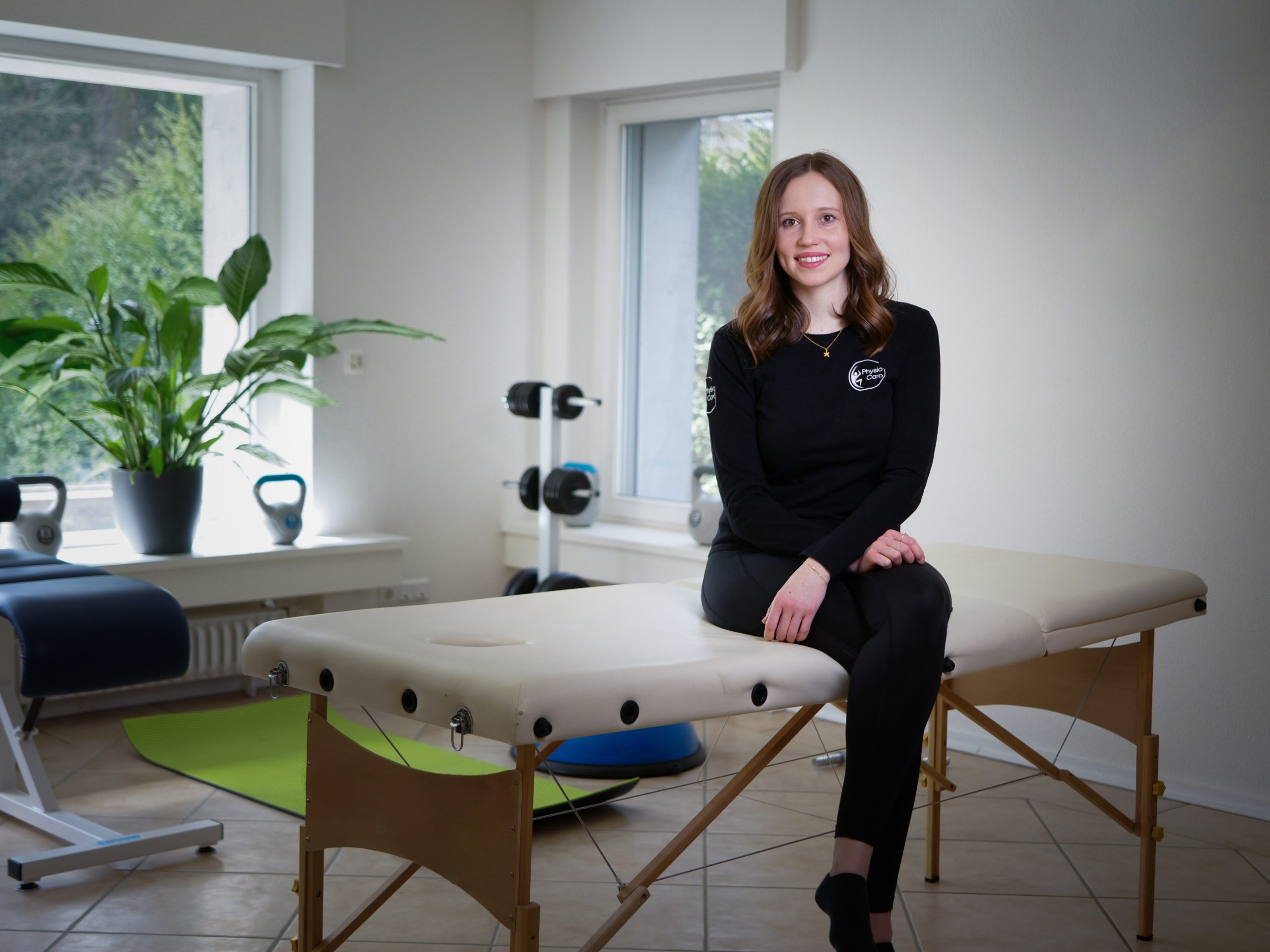“No one imagines pain!”
Interview with Endometriosis Patient Caro
Hi Caro, we are delighted you took the time to chat with us today about your experience with endometriosis. Could you please share a bit about yourself?
Caro: I’m Caro, originally from near Frankfurt. I received my endometriosis diagnosis in March 2020 following a laparoscopy, but I’d been grappling with issues for approximately a decade. It’s the classic scenario: you’re not taken seriously, and eventually, you piece together on your own that it might be endometriosis. Nowadays, I’ve found a reasonable balance with medication and dietary adjustments. There are good days and not-so-good ones, but I manage.
What does endometriosis mean to you?
Caro: Personally, endometriosis used to entail spending entire days, sometimes every two weeks, in excruciating pain, relying heavily on painkillers and the comforting presence of the hot water bottle on the sofa/ I could barely move. Now, I’ve learned to be more attentive to my body. It’s a learning curve. If I’ve been quite active one day, say, engaging in sports, managing household chores, or tending to the garden, I’ve realized that I need to take it more leisurely the next day; otherwise, my body reminds me of the consequences.
You mentioned it took quite a while before your endometriosis was diagnosed. Can you share your medical journey leading up to the final diagnosis?
Caro: It all began when I was 16 or 17, and I started experiencing severe abdominal pain, regardless of my menstrual cycle. You’re somewhat naive at that age, thinking it might be expected. Over the next five years, the pain intensified. I tried taking birth control pills, thinking that skipping my periods would bring relief. However, I eventually could not tolerate the pill anymore. A friend of mine has an irreparable brain tumor and suggested I try CBD oil. He’s been using it and was very satisfied with the results. So, I started researching it and eventually found a connection between CBD and abdominal pain. This indirect path led me to consider that my condition might be endometriosis. When I mentioned this to my gynecologist, they brushed it off, offered a homeopathic remedy, and discussed other medications. Feeling frustrated, I switched practices and discovered the Endometriosis Center in Frankfurt. I promptly scheduled an appointment there, and they agreed that endometriosis could be the issue. Two weeks later, I underwent the operation.
How did you feel after the surgery?
Caro: Considering the removed endometriosis lesions, I hoped to feel significantly better after the operation. However, that wasn’t the case. My symptoms worsened, and I had to start taking medication relatively quickly. This was challenging, as one of the prescribed pills didn’t agree with me at all. After just a few days, I experienced anxiety and became depressed. We tried other pills, but they didn’t provide the desired relief either, and I didn’t want an IUD. I’m now on Dienogest and gradually regaining a sense of well-being. I can finally resume my weight training, which I couldn’t do for over two years because one of the endometriosis lesions was pressing on a nerve, causing pain during workouts. Now, I can lift weights again, and it’s a source of joy.
I also firmly believe that regular exercise makes a significant difference, and it was pretty distressing not being able to go to the gym during the COVID-19 pandemic. I can only imagine how challenging it must be when you are so uncomfortable that you can’t engage in physical activity.
Caro: It was indeed challenging. Fortunately, I have my physiotherapy setup at home with exercise equipment, so I can continue exercising. That’s a small luxury. Not everyone has the opportunity or space to engage in physical activity in a compact apartment.
How did the people around you react to your complaints leading up to your diagnosis? Did you share your symptoms with others?
Caro: Eventually, I became relatively open. At that point, I didn’t know about endometriosis. I faced the most significant challenges at work with my colleagues since they had to cover for me when I was unwell, and understandably, this became frustrating for them. However, I explained everything to them. I told them about the severe abdominal pain that rendered me unable to stand upright, emphasizing that I wasn’t doing it on purpose. Unfortunately, even after the surgery, the pain persisted for a while, and I didn’t receive much understanding. It was quite the opposite. It’s something I’ve noticed; men in my circle of friends are more empathetic. One of them recently said, “Caro, I don’t want to upset you, but I read up on this, and I saw that it might affect your ability to have children.” It truly touched me. Women downplay abdominal complaints because they assume “everyone” experiences them. Surprisingly, more compassion often comes from men than women. Endometriosis eventually substantially impacted my work, leading me to leave that practice and establish my private one. I’m now managing well, and my new colleagues are more understanding after I shared my situation with them.
Are you planning to work exclusively in your private practice in the future?
Caro: Not at the moment. I want to continue working as part of a team and exchange ideas with colleagues.
Why do you think endometriosis is still so underestimated?
Caro: I believe it’s because many people can’t comprehend the suffering caused by such pain. The tendency of other women to downplay abdominal pain certainly contributes to this underestimation. Furthermore, many doctors are inadequately informed about it. My family doctor, for instance, was unaware of endometriosis until my case, but he responded positively. Initially, he wasn’t familiar with the condition, but at our next appointment, he was well-informed, having educated himself about it. That should always be the case, but until then, it remains a challenge.
That is right. There is a need for more education among primary care physicians because many endometriosis symptoms might not be initially associated with gynecology. You typically visit a family doctor if something seems off in the gastrointestinal tract. However, if they are unaware of the possibility of endometriosis, they might not consider it a potential cause.
Caro: I found it quite alarming when I shared with my family that my grandmother, mother, and aunt also suffered from severe symptoms but never discussed it much. I subsequently learned that endometriosis can be partly hereditary. In hindsight, I wonder if they also had endometriosis. Perhaps they were in a generation where such matters weren’t discussed openly. My mother always mentioned experiencing intense labor-like pains. So, for me, it felt like a normal part of life. After my diagnosis, I became concerned about my ability to conceive naturally. That’s when my mother revealed that it took her a year and a half to become pregnant with me. Given all these descriptions, I suspect she also had issues before.
What limitations do you currently face in daily life?
Caro: Although there’s been an improvement, I occasionally experience classic fatigue. For instance, I sometimes need to rest after running errands or taking my dog for a short walk. I realized I couldn’t physically manage a full workweek, so I reduced my hours with my previous employer, working four days instead. I genuinely need those three days to recover. I’m back to working five days a week due to my private practice, but I hope to reduce it again soon because I’m often completely exhausted on weekends. The pain occasionally limits me, causing me to cancel plans. My diet is also restricted. I had a gastrointestinal endoscopy, which revealed sensitivities to gluten, lactose, and soy. Additionally, due to endometriosis, I avoid meat and fish. Dining out with me isn’t enjoyable. It’s no fun for me, and it’s not fun for my friends either. This is where endometriosis significantly limits me. Diet has a huge impact, so I’ve chosen to consume vegetables and vegan alternatives without soy. I think it’s become easier to be more mindful of my food choices without feeling like I’m missing out.
There’s one silver lining to this. I’ve lost around five or six kilograms, which I wanted to shed anyway. What I genuinely miss is the occasional piece of chocolate. I’d love to indulge, but every package I check has a label that says, “May contain traces of gluten, soy, milk, etc.” So, I can’t have it for now. My doctor advised me to avoid these foods for a year altogether and then slowly reintroduce them.
What advice would you offer to other women?
Caro: First and foremost, I’d advise them to listen to their bodies. Your body often gives you signals about whether things are going well or not. Years ago, I realized that gluten and lactose weren’t agreeing with me, and that’s confirmed now. Pain is always real. I often share this with my pain patients. You don’t imagine pain. While doctors might say that sometimes, pain is always real, and you should heed it. You can explore physical therapy and consider options like pelvic floor therapy. Overall, persevere, and if you are experiencing discomfort, don’t hesitate to seek answers.
Thank you so much for sharing your story.
- “Take yourself and your endometriosis seriously. You are not imagining things!” - 7. November 2023
- Interview with Endometriosis Patient Nina - 7. November 2023
- Interview with Endometriosis Patient Nina - 7. November 2023


